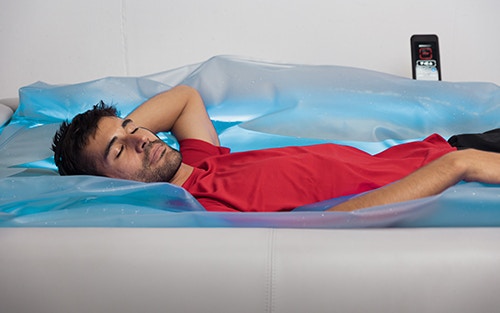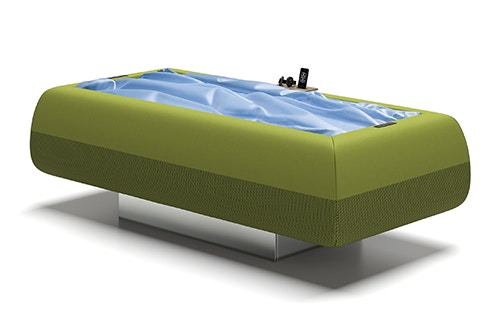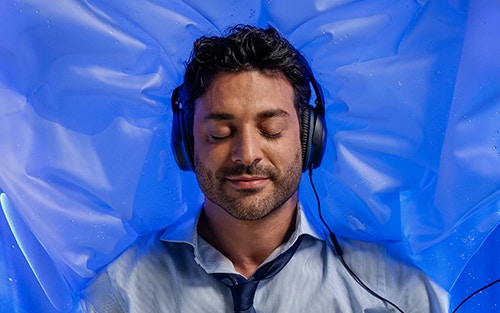Wondering what flotation therapy is and if it’s a good option for your needs? Understanding flotation therapy will help you make informed decisions about what spa therapy to use for stress and tension relief.

yourfootpalace.com gathered essential information about flotation therapy’s definition, origin, evolution, and benefits.
Flotation Therapy Definition
Flotation therapy (sensory deprivation, float therapy, or floatation tank therapy) is a therapy that involves floating in a shallow pool or tank filled with water having a high concentration of Epsom salt (magnesium sulfate). The high salt concentration allows the body to effortlessly float on the water’s surface, providing a weightlessness sensation.

A flotation tank is designed to be lightweight and soundproof, and the water is heated to skin temperature, creating an environment of sensory deprivation. This environment is intended to aid individuals in achieving a deep state of relaxation and mental calmness, as it significantly reduces external stimuli like light and sound.
During flotation therapy sessions, individuals typically wear earplugs and are encouraged to relax, meditate, or let their thoughts aimlessly drift. Some people report feeling a sense of mental and physical rejuvenation after flotation therapy, as it can help reduce stress, alleviate pain, and improve sleep.

The Origin of Flotation Therapy
Flotation therapy originated in the 1950s when American physician and neuroscientist, John C. Lilly, began researching the effects of sensory deprivation on the human brain. Lilly was interested in exploring the nature of human consciousness. He believed that sensory deprivation could help individuals efficiently achieve altered states of consciousness.
In 1954, Lilly designed and built the first isolation tank, called the “Sensory Deprivation Tank.” It was a small, enclosed tank filled with “body temperature” water and had a high concentration of Epsom salt, allowing users to effortlessly float. The tank was designed to be light and soundproof, creating an isolated sensory deprivation environment.

Lilly conducted numerous experiments with the isolation tank, observing the effects of prolonged sensory deprivation on the mind and body. He found that subjects who spent extended periods in the tank reported various experiences, from deep relaxation and euphoria to hallucinations and altered consciousness.
Lilly’s sensory deprivation and isolation tank research established the groundwork for modern-day flotation therapy. In time, other researchers and therapists began experimenting with flotation tanks as a tool for relaxation, meditation, and therapy. Today, flotation therapy is a popular alternative therapy offered at spas, wellness centers, and medical facilities worldwide.
The Evolution of Flotation Therapy
The evolution of flotation therapy has led to the development of dry flotation therapy, which is a more recent innovation in the sensory deprivation and relaxation therapy field.
Dry flotation therapy (dry floatation, dry float, or dry hydrotherapy) is a form of flotation therapy without water immersion. Instead, it uses a special bed or cushion filled with warm, dry air to simulate a floating sensation. The bed or cushion is typically covered with a waterproof and heat-retaining material, like neoprene, to create a sensory deprivation environment.
Dry flotation therapy has several advantages over traditional water-based flotation therapy. It eliminates the need for individuals to disrobe and immerse themselves in water, which can be uncomfortable or inconvenient for some. It also eliminates drowning or infection risks, which can be a concern in water-based flotation therapy.
Dry flotation therapy has similar therapeutic benefits to water-based flotation therapy, like reducing stress, alleviating pain, and improving sleep. It has also been used in multiple clinical settings, including physical therapy, rehabilitation, and pain management.

Note: The development of dry flotation therapy represents an evolution of the original concept of flotation therapy, allowing for greater flexibility and accessibility in terms of how and where the therapy can be provided.
Dry Flotation Therapy Benefits
Dry flotation therapy has several potential benefits for the mind and body. Some of the benefits of dry flotation therapy can include the following:
- Relaxation – Like water-based flotation therapy, dry flotation therapy induces a deep state of relaxation, which can help reduce one’s stress and anxiety.
- Pain Relief – Dry flotation therapy helps alleviate physical pain, like back or joint pain, by reducing pressure on the body and promoting better blood circulation.
- Improved Sleep – Dry flotation therapy improves sleep quality by promoting relaxation and reducing stress and anxiety.
- Skin Rejuvenation – Dry flotation therapy’s warmth and gentle pressure can help stimulate blood circulation and promote lymphatic drainage, which helps rejuvenate the skin and promote a healthier glow.
- Increased Mindfulness – Dry flotation therapy’s sensory deprivation can help individuals become more mindful and introspective, which promotes self-awareness and personal growth.
- Athletic Recovery – Dry flotation therapy can significantly benefit athletes. It can help reduce muscle soreness and promote recovery after intense exercise or competition.

Note: While dry flotation therapy has multiple potential benefits, it may not suit everyone. Those with certain medical conditions, like claustrophobia, high blood pressure, or epilepsy, should consult their primary care physician before trying dry flotation therapy.
Float Therapy
In this article, you discovered what flotation therapy is, its origins, and how it evolved into today’s dry flotation therapy.
Knowing what flotation therapy is and how it has evolved will help you make informed decisions about what therapy is ideal for your needs.
Your lack of understanding about flotation therapy may lead you to choose less effective forms of therapy, leaving your stress and anxiety unresolved.
Sources:
differentbrains.org/a-firsthand-look-at-the-benefits-of-flotation-rest-reduced-environmental-stimulation-technique/
https://etd.ohiolink.edu/apexprod/rws_etd/send_file/send?accession=osu1574672585011734&disposition=inline
journals.plos.org/plosone/article?id=10.1371/journal.pone.0190292
time.com/floating
sciencedirect.com/science/article/abs/pii/S0272494405800751?via%3Dihub
(706) 521-5290